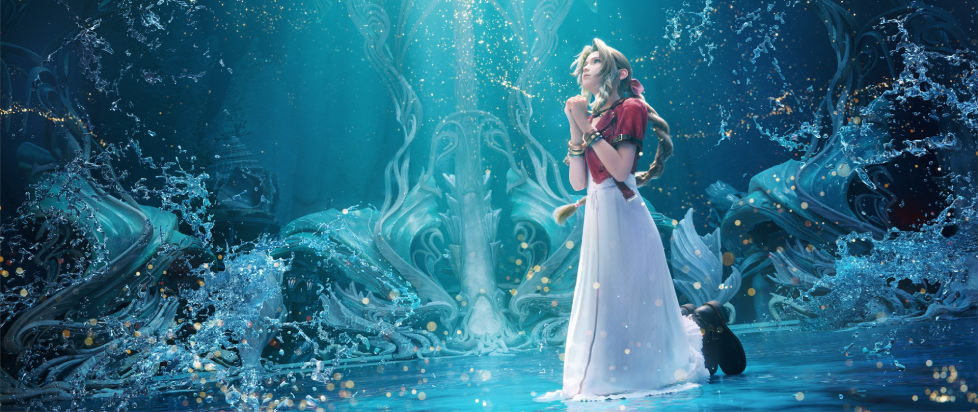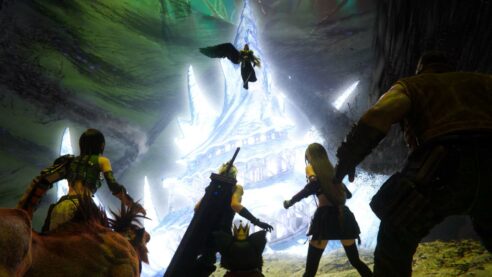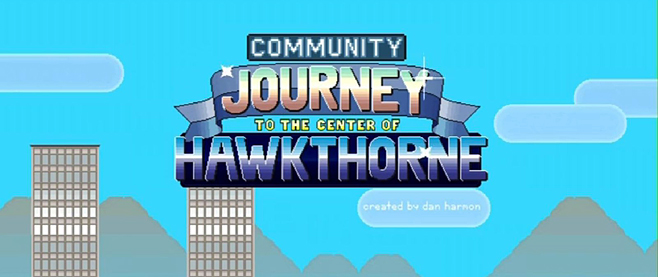
Death, Doubt and Dynasties: The Unlikely Link Between Aerith Gainsborough & Logan Roy
Major spoilers for Final Fantasy VII Rebirth and Succession Season 4, starting from paragraph one. You’ve been warned.
———
On the face of it, Final Fantasy VII and Succession don’t share much in common. Almost everything about their form and presentation is diametrically opposite. While Succession wrings drama from gritty, expletive-infused familial conflict in sterile boardrooms, Final Fantasy VII goes all-in on earnest, overblown anime tropes: amnesiac protagonist, drawing on the power of friendship to defeat kaiju, etc. If you had to draw some tenuous connection, it would surely be between the fascistic dynasties of the Roy and Shinra families, both serving as warnings of the corrupting influence of absolute power and the dangers of unfettered capitalism. Having finished both Succession and Final Fantasy VII Rebirth in the last year, however, I was struck by a much less expected parallel – between Logan Roy and Aerith Gainsborough. Well, not their characters per se, but in the handling of their deaths, and how their indirect presentation sows confusion and doubt among both the viewer and the characters, to devastating effect.
Upon reaching the end of Rebirth’s gargantuan main quest, I found myself as confused as I was overwhelmed by its mind-bending conclusion. At the end of the preceding game, 2020’s Final Fantasy VII Remake, Cloud Strife’s ragtag band of eco-terrorists comes face-to-face with (who else) the manifestation of fate itself. Upon its defeat, we are promised that the ties of destiny are now broken, and anything about this story that many of us know so well could change in subsequent installments. Much of the four year lead-up to FF7 Rebirth has involved fan speculation over Aerith’s eventual fate, and whether her sacrificial death would occur as it did in the original 1997 game – a mystery which is arguably the core motivating force of the whole of Rebirth. Although this promised moment is the final climax of Rebirth’s story, things aren’t actually much clearer upon reaching the credits. A potent cocktail of shifting perspectives, denial, unreliable narrators and PTSD-induced hallucinations left players unsure of what they actually saw happen to Aerith, and in doing so made for an emotionally unbalanced conclusion. Cloud sees himself block the killing blow of archvillain Sephiroth’s plunging sword, and is cheerily chatting to what he believes to be a living Aerith in the game’s final scenes. What the rest of the party observes, however, is a very-much-dead Aerith, covered in blood, and thus they spend the end of the game in mourning, while shooting worried glances over to Cloud. The jarring intercutting of these perspectives in the last hour of the game, coupled with the fact that we never actually see the blade pierce Aerith’s back, leave the player as bewildered as the party themselves.
This choice frustrated many players when they first experienced it, with many complaining that this approach completely dulls the emotional impact of an iconic moment. It’s hard to argue with this point-of-view. After four years preparing for either Cloud’s inevitable failure, or a fate-defying moment of victory, we’re instead left scratching our heads. The more I think on it though, the more I think this approach might actually be pretty smart – and the key to understanding why can be found by looking at a very different kind of character.

Succession‘s handling of Logan Roy’s death at Connor’s wedding is far from the overwhelming, epically-scored affair seen in Rebirth. The Roy siblings are huddled around a phone with poor signal, struggling to ascertain what is actually happening to their father as he slowly fades away, out of sight, receiving CPR on a plane hundreds of miles away. Logan’s health is an ongoing concern from the first season of the show, and if the name “Succession” wasn’t enough of a clue, much of the drama stems from the shifting fates of the children as to who will take over the family business when Logan does eventually pass. As with Aerith, then, many years are spent building up this moment in the viewer’s imagination. What would that fateful moment look like? Surely something grand – a sudden heart attack in a crucial board meeting? Smothered by one of his desperate offspring? No, as often happens, the moment of Logan’s death is cruelly blunt, coming completely unexpectedly, on a supposed day of celebration, entirely off-screen.
On the other end of the phone, imparting the news to the Roy children, is Tom, Logan’s sycophantic son-in-law, who is currently experiencing an extremely bitter patch in his marriage to Shiv Roy. In a show largely about bitter mistrust brewing between family members, all four of the Roy siblings have more than enough reasons to doubt the veracity of what Tom is saying. Surely he wouldn’t fabricate a parent’s death as some kind of play? There’s not much you’d put past any of the members of this particular family. So, like the Roy children, we’re left wondering if this is even real. The same is true for the viewer – we only have the same information as the huddled family on the boat, and it takes a while to accept that the seemingly unkillable Logan is gone.
Below the surface, both FF7 and Succession are pulling a similar trick. By tightly controlling what the viewer witnesses, and instead presenting a combination of character perspectives, we are forced to work through the death in a much more tangible way. Once the news of Logan’s death is passed through the filters of a patchy phone call and a mistrusted spouse, the family must process it over time to ultimately accept what is happening. This is especially true for the youngest, Roman, whose usual defense mechanism of detached sarcasm and emotionlessness is utterly useless against the news. As such, he descends into denial, and refuses to believe it until seeing a body. Meanwhile, Final Fantasy VII is littered with moments which make us doubt Cloud’s mental state, including his perspective on Aerith’s fate. The ending scenes of the game make it seem as though the rest of the party experienced an entirely different turn of events, and the expression on his childhood friend Tifa’s face in the last moments leave us in no doubt that at least in some version of reality, Aerith has been killed. Cloud and Roman are alike in their complete lack of emotional fortitude, and Roman’s headlong dive into denial is (perhaps) the exact route that Cloud has taken. The mechanisms in these two cases are different in many ways, but the effect on the viewer is ultimately the same – doubt, denial, and ultimately grief.

“Connor’s Wedding” is one of the strongest episodes of Succession because it manages to exploit four seasons worth of bubbling tension all at once, by trapping the entire family together and forcing them to work through every complicated feeling they have for their tyrannical father together, with no escape. The success of Rebirth’s approach will, frustratingly, probably only become apparent when the final part of the trilogy releases many years from now. Is this a masterful way of presenting Cloud’s fractured mind in a new and unexpected way, or just a result of an unnecessarily convoluted multiversal storyline with no satisfying resolution? Time will tell, but for the next few years, fans of the series will have much to discuss about what can, and should, change in this story that is known so well.
Both Rebirth and Succession play with character perspective to make the player/viewer doubt what they are seeing and hearing, and crucially never explicitly show the moment of death. In doing so, they draw us into the confused mental state of the characters as they process the character’s passing, and eventually come to terms with it. As hard as it may be to imagine an end to Final Fantasy 7‘s story with Aerith surviving, it is equally hard for the Roys to imagine a world without their seemingly immortal father. It makes the grief and shock tangible, not just a moment in a story being told, but an actual process through which both the characters and viewer must go. While neither might be what we were expecting, this approach ensures that these deaths worm their way into your consciousness in a way a quick swing of the sword could not.
———
Jonathan is a biological researcher by day, but spends much of the rest of his time obsessing over games, music and music in games. You can follow him on Bluesky and at Medium.





